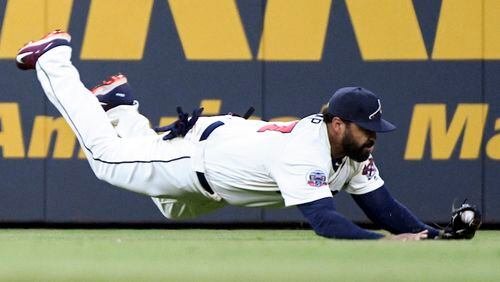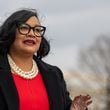Matt Kemp cradled a baseball cap in his hands. The color was the same, the blue he had worn in the Dodger Stadium outfield for nine years. Only the logo was unfamiliar, a "D" stitched where "L.A." used to be, a spring marketing ploy showing the passage of time. Kemp traced his thumb across the lettering.
"It's a little different, man," Kemp said to a small group standing near his locker. "How you like it?" He shrugged his shoulders. "Hey, I just work here, man."
That reality could not be ignored as pitchers and catchers — along with a few position players — reported to Camelback Ranch on Tuesday morning. It felt remote even after the Dodgers reacquired him in December. Yet here Kemp stood. He looked fit, 40 pounds lighter than the bloated figure he displayed during his final days as an Atlanta Brave. He sounded ebullient, grateful for even his remote chance of breaking camp as a Dodger again.
For a team returning the overwhelming majority of a pennant-winning roster, the presence of Kemp serves as this spring's most intriguing story line. During his first tenure as a Dodger, he reached two All-Star teams and finished as an MVP runner-up. The prospect of a revival in Los Angeles delighted him.
"I've got a whole new outlook on life," Kemp said. "I'm having fun. I'm going to have fun and ride this thing until the wheels fall off. Literally."
Kemp, 33, stressed the wisdom of his years and his passion for Los Angeles. He expressed his gratitude about returning to the Dodgers after being traded away following the 2014 season. He clarified his implicit criticism about the city not being a "baseball town." He disputed reports emerging about his negative influence on the Braves' clubhouse. He insisted upon his viability for a championship contender. "I've got a lot left in me," he said.
Yet the Dodgers did not acquire Kemp with the intention of playing him in left field. His value arose from his contract. In return for Kemp, the Dodgers sent a four-player package that included Adrian Gonzalez, Scott Kazmir and Brandon McCarthy to Atlanta. The trade reset the Dodgers' luxury-tax payroll and will allow them to remain under the $197-million threshold in 2018, meaning they can pursue free agents like Clayton Kershaw, Bryce Harper and Manny Machado next winter with greater freedom.
The motivation was financial. Kemp understood the score. The move still stunned him. He was dining with some friends in December when he received a call from his agent, Larry Reynolds. Reynolds informed Kemp he had been traded.
"Where?" Kemp asked.
Reynolds started to laugh as he passed along the destination.
"Stop lying," Kemp said.
The truth made his head swim. Soon after, he heard from Dodgers officials. The team could not promise him much. They were actively looking to move his contract, for which he will receive $43 million over the next two seasons. Kemp would be a Dodger until the team could find him another home.
An awkward dance ensued. The Dodgers did not invite Kemp to FanFest last month. The organization wanted to avoid subjecting Kemp to questions about his status. Yet efforts to send Kemp elsewhere proved fruitless. A market did not swell for an aging outfielder who is viewed by defensive metrics as one of the worst in baseball.
Despite his sense of limbo, Kemp worked out at Dodger Stadium during the winter and stayed in contact with his teammates. He took in a Los Angeles Lakers game with Kenley Jansen. He received a welcoming text message from Kershaw a couple of weeks ago.
"I've seen him at his best," Kershaw said. "I know how good he can be. I know he still has the ability to hit a baseball really well. I hope he gets that chance to prove it here."
Kemp remains a useful hitter. He swatted 19 home runs in 115 games with a .781 on-base-plus-slugging percentage in 2017. It is his defense that limits his appeal. Kemp ranked 205th in Ultimate Zone Rating among the 208 outfielders who played at least 100 innings last season.
Manager Dave Roberts acknowledged Kemp's limitations in the field. He listed a trio of factors that could aid a revival: effort level, fitness and positioning.
The Dodgers believe Kemp will be motivated, after three seasons spent in big league basements, by an opportunity on a contender. Kemp credited an improved diet — more water, smaller portions — along with a renewed interest in conditioning for his upgraded physique. In previous years, the Dodgers utilized advanced scouting reports to properly position converted infielders like Chris Taylor and Howie Kendrick as they learned the outfield.
"I expect there to be a huge uptick in the metrics this year," Roberts said.
The Dodgers will keep Kemp active during the spring. The team lists him as a competitor for at-bats with Joc Pederson, Enrique Hernandez and Andrew Toles. Toles will be eyed carefully as he returns from a torn ACL. Kemp could form part of a platoon with Pederson. Or the front office could finally find another club, probably from the American League, who is willing to take on part of Kemp's salary.
Until then, he is a Dodger. He arrived at Camelback Ranch last week. On Tuesday he bantered with reporters he remembered from the past and asked about the whereabouts of former members of the beat. He joked about how he did not want to conduct a formal interview.
"We've got a workout," cracked third baseman Justin Turner. "Don't put him in a bad mood before we go outside."
"That's the thing about getting older," Kemp said. "You can't ruin my joy."
Kemp maintained that vibe throughout the morning. He stressed that he did not mean to criticize Los Angeles when he remarked last summer that by coming to Atlanta he was finally playing in a "baseball town."
"L.A., when I first got here, it was all about Kobe and Shaq," Kemp said. "As the years went on, as we started winning more games, the city came alive. We had the best fans. We became a baseball town. Never said L.A. wasn't a baseball town. I would never say that. I love L.A. I love the fans. I would never disrespect the fans who helped me get to who I was, and who I am."
Kemp pointed at a camera for emphasis.
"Bam. And that's the truth."
Kemp downplayed the stories that followed him from Atlanta, where he was described as a negative influence on team culture.
"I don't know how that came out in Atlanta that I was bad in the clubhouse," Kemp said. "I don't think I was there long enough to be bad."
His second tenure as a Dodger might not last beyond this spring. Kemp hopes for more.
"This is where I came up," Kemp said. "This is where I grew up. I always wanted to win a World Series here, and win here. It was fun watching these guys last year play and get to the World Series. Why wouldn't I want to be a part of it?"






